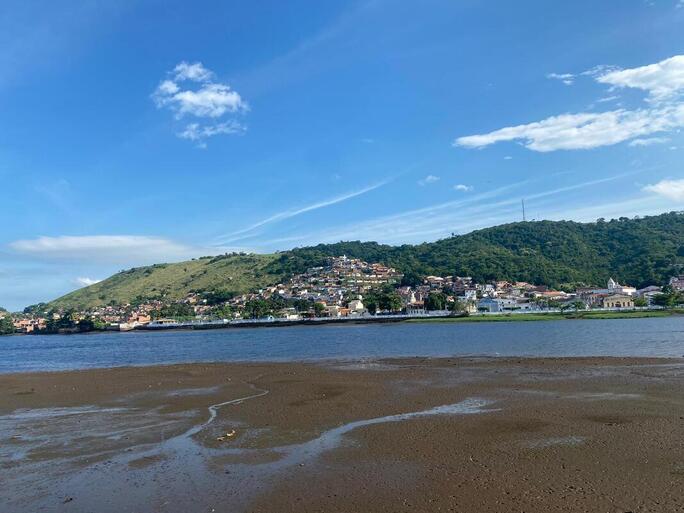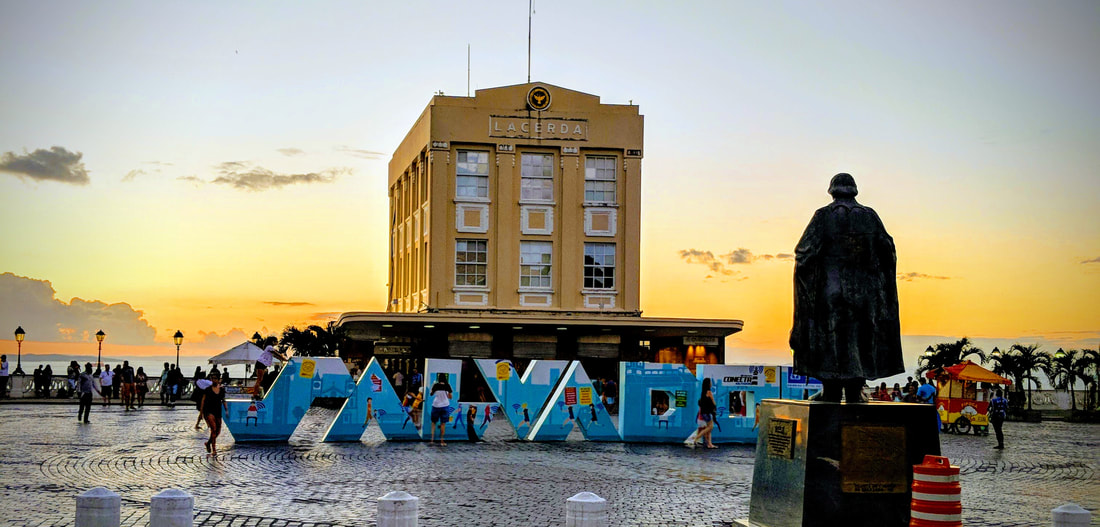 This here is a photo I took in Cachoeira. If you look closely, you'll see many underdeveloped houses are located quite close to one another. Although this is how many people live, it highlights the poverty and underdevelopment that people endure. This here is a photo I took in Cachoeira. If you look closely, you'll see many underdeveloped houses are located quite close to one another. Although this is how many people live, it highlights the poverty and underdevelopment that people endure. By Zach Jans and Ryan Engels  This is the start of the roadwork crew. The man on the far right, was the only white man there all day long. He is also the only man that didn’t lift a tool, move the cement, or get dirty at all. By the end of the day, there were approximately 20 men, all doing hard labor, besides the white man in this picture. This is the start of the roadwork crew. The man on the far right, was the only white man there all day long. He is also the only man that didn’t lift a tool, move the cement, or get dirty at all. By the end of the day, there were approximately 20 men, all doing hard labor, besides the white man in this picture. After completing our semester of school, we were finally able to travel abroad to Salvador, BA in Brazil. So far in our stay, we have been learning so much about the culture and lifestyle from lectures, our host parents, and exploring with our class. In this blog, we will connect things we have noticed during our stay with what we learned during class before this trip. In one of our first lectures, we met with Cloves Oliviera, who is a professor at the Federal University of Bahia. Oliviera went over many of the basic facts regarding how schools and universities look and work in Brazil. However, there was one thing that stuck out to us. He mentioned how whites and pardos dominate the population, and that one in four candidates for college “change their color” when registering again for ENEM. He explains that people do this because changing their color identification can benefit different areas of their lives such as the probability of getting into school/college. Clearly, this puts minorities at a disadvantage of pursuing an education due to people changing their race in order to benefit themselves. The following quote connects to this information: “In education, work conditions, legal status, family status, and social freedom, women are making exponential gains, Yet, just as one force seems to move gender roles forward, they are constrained by other forces that want to hold them back” (Baldwin, DeSouza, 2001, 23). The fact that people are getting away with changing their race on paper just shows that minorities, including women, are constantly being held back in some form. This example that Oliviera shared with us supports the quote I read during class back in the US. In our lecture regarding Afro-Brazilian religions, it was mentioned that Bolsonaro did not do a census in 2020 due to the fact that it would show high numbers in poverty and underdevelopment. We found this interesting because it sounds like Bolsonaro is trying to ignore poverty being a big issue. Although this quote relates to a different topic, I think it connects to this information in a way. The quote states that “conservative voters perceive the prevalence of VAW as exaggerated and do not prioritize tackling VAW on the policy agenda” (Araujo, Gatto, 2022, 144). Although this is about Violence Against Women, the key information in this is conservative voters perceiving it as exaggerated and not prioritizing the issue. I think this may be a common theme between both poverty and violence against women, both issues that mainly fall in the category of minorities. While being in Brazil, there have also been situations outside of our true class time that have caught my eye. When reading one of the passages before coming to Brazil, the article wrote, “these differences, as we will discuss, seem to explain some distinctions observed in the perception of youth regarding the weight of race and social class over discrimination and, therefore, over their ability to recognize manifestations of racism in police practice” (Anunciação et al., 2014, 236). When reading this, it made me curious as to what the police presence is like in a large, poverty driven city like Salvador. What I have noticed is that there is a police presence everywhere you look. When we have been walking or driving places, I have tried to keep my eyes open for the police. It is hard to find a time where there isn’t a police officer or police car in sight. This is very unfortunate because whether the police force means for it to be discriminating or not, it seems to be an abuse of power. The intimidation that the police seem to be giving off towards the locals seems to be asking for trouble and seems to end poorly for the locals nearly every time. Another story that comes to mind when thinking about our time in Salvador so far is about the construction that is taking place right outside our host building. One morning, we woke up and there was construction going on right outside the front window of our apartment. I looked at the workers briefly but didn’t pay much attention. When we were waiting for our Uber to show up, I started to look at the workers a little more clearly. There were about 20 men working, one of which was white. This white man was doing all the talking and pointing, but none of the actual work. All of the dirty work was done by the rest of the workers, all of which were either of mixed race or black. When thinking back on the readings we read, I think this quote fits this situation. Silva wrote, “National and international literature shows that, since childhood, men and women have been instructed in male dominance, such as the power of men over women and their subservience without questioning” (Silva, et al., 2020). Instead of women however, it was people of color in this situation. With slavery ending so late in Brazil, you could see that the white male was instructed of his dominance and the people of color did as he instructed. Bibliography Silva, et al. “Social Attributes of the Male That Incite the Violence by Intimate Partner.” REBEn, 73, no. 6 (2020): 1-7. http://dx.doi.org/10.1590/0034-7167-2019-0470 Anunciação, et al. “Hands up!”: Police Stop-and-Frisk, Racism and Structural Violence among Black Youth from Three Capitals in the Brazilian Northeast." Saúde Social São Paulo, 29, no .2 (2020): 1-13. https://www.scielosp.org/pdf/sausoc/2020.v29n1/e190271/en. Araujo, Victor, and Malu A. C. Gatto. "Can Conservatism Make Women More Vulnerable to Violence?" Comparative Political Studies 55, no 1 (2022): 123–145. https://journals.sagepub.com/doi/10.1177/00104140211024313 Baldwin, John, and DeSouza, Eros. "Modelo de María and Machismo: The Social Construction of Gender in Brazil." Revista Interamericana de Psicología/Interamerican Journal of Psychology 35, no. 1 (2001):9-29. https://www.redalyc.org/articulo.oa?id=28435101  Ryan Engel is a sophomore at CSB/SJU, pursuing a major in Accounting/Finance with a minor in Communications. He is originally from Green Bay, Wisconsin. Ryan enjoys broadening his horizons by traveling and learning about different places, people, and cultures. He is also a sports fanatic, including playing soccer at Saint John's University. He looks forward to exploring a new part of the world while studying abroad in Brazil in May 2022  My name is Zach Jans and I am finishing my sophomore year at SJU. I am currently an Elementary Education and Political Science double major. I am from St. Michael, MN. A big reason I like learning about teaching and why I am excited to be a teacher is that I look forward to finding ways to motivate all students and be a role model for young students. I have always been involved with sports, playing baseball and basketball my whole life, until college. I stay active in intramurals. Outside of school, I like to golf, hangout with friends and family, and spend time at my cabin.
0 Comments
Leave a Reply. |
Archives
June 2024
Categories
All
|

 RSS Feed
RSS Feed
